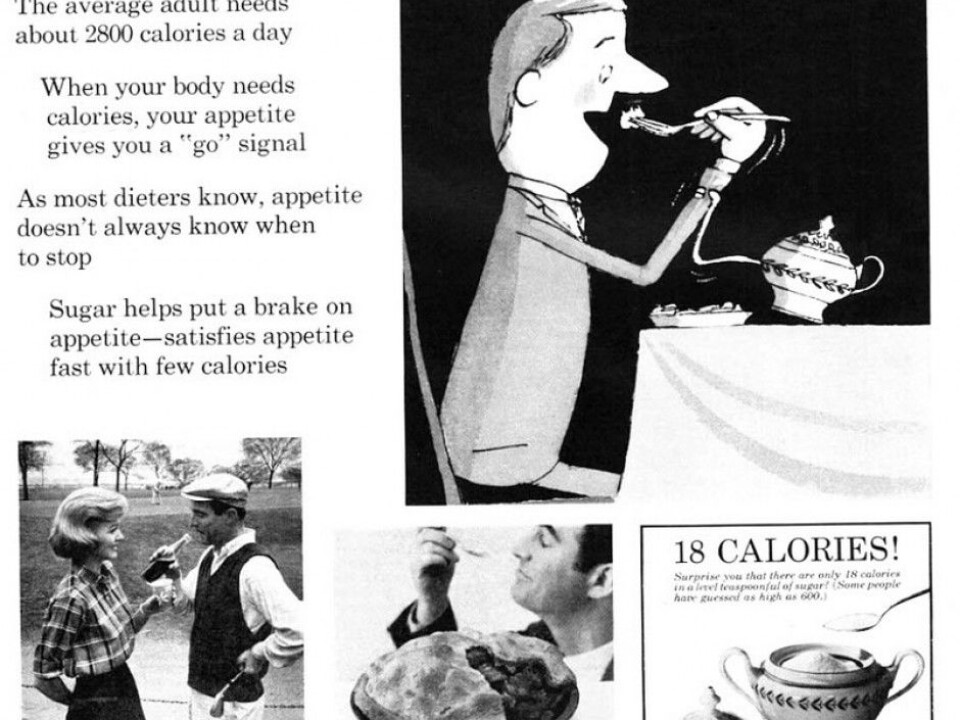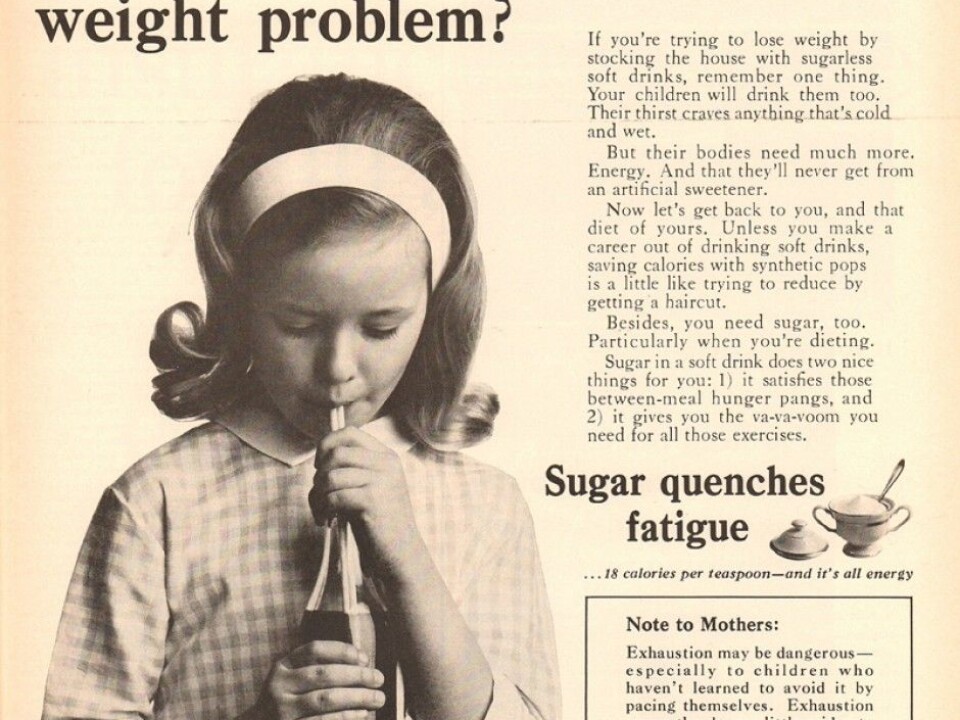
When science promoted sugar as healthy
Studies in the 1970s showed that people couldn’t get overweight or develop cardiovascular diseases from consumption of carbohydrates such as sugar. A Norwegian professor thinks we are still paying for this mistake.
Denne artikkelen er over ti år gammel og kan inneholde utdatert informasjon.
Fats were singled out as the major enemy.
Research results published in the mid-1900s indicated that fats in our diets posed a health hazard.
Fats were not just full of calories that made us overweight. There were indications that fats were the main reason why a wave of cardiovascular diseases washed over the industrialised countries of the West starting in the early 20th century.
Research efforts and nutritional advice focused on how dangerous fats were and toward the end of the century a healthy diet consisted low-fat foods – a message heard at the doctor’s office and hyped by all the magazines.

Simultaneously, carbohydrates, including sugar, snuck below the radar, according to Birger Svihus, a professor at the Norwegian University of Life Sciences (NMBU).
Why were carbs viewed so long as positive for health?
Svihus thinks he has found the answer in research:
Scientists in the 1970s concluded that the human body could not convert carbohydrates into fat.

That meant you couldn’t become overweight or clog your bloodstream with fats by eating carbohydrates, whether they came from sweets or whole grain bread.
“This is one of the biggest mistakes in modern nutritional research,” says Birger Svihus, who recently lectured on the subject at a seminar on fats and carbohydrates in diets at NMBU.
Thought that the human body couldn’t make fat
Conversion of consumed carbohydrates into body fat in a well-known phenomenon in the animal kingdom. We know that many species, for instance rats in labs and pigs in a pen, do this all the time. This is also why cattle and sheep have lots of fat on their bodies, even though they naturally eat almost nothing but the carbs and fibres they get from grasses and other plants.
Researchers initially assumed that this conversion also occurred in humans too.

Then research arrived pointing in a different direction. In experiments with human cells in the 1970s, scientists found that only a minimal amount of carbs were transformed into fat.
“I think I’ve found the classic article which established this ‘fact’,” says Svihus.
He was referring to a paper by the renowned Swedish researchers Per Björntorp and Lars Sjöström, published in Metabolism in 1978. They argued that research now showed that carbohydrates neither were transformed into fat in the human liver nor fattened our waistlines and butts.
Couldn’t get too much sugar
“Following this was a convenient finding which indicated that carbohydrates, sugar, had a more satiating effect than other nutrients,” says Svihus.
“And the researcher J. P. Platt lauched the hypothesis that as the body couldn’t get rid of carbohydrates by converting them to fat, our appetite was a control mechanism ensuring that we didn’t consume too much sugar.”
In other words, we would stop eating candy and other sweets on our own volition before they became too much for the body to handle.
In 1995 the esteemed Danish scientist Arne Astrup thought he found strong indications that carbohydrates were important contributors in our diets to keep our weight down.
Carbohydrates could play a vital and positive role, particularly for people with a genetic disposition for obesity, in part by curbing their appetites.
Sugar makes you full
Svihus thinks all this spilled over from the realm of research to the daily lives of the general public. To illustrate this, he points out the text from an old package of sugar:
“Carbohydrates burn before fat and protein. They do not get transformed into fat, but turn into energy for the muscles and the brain, and they fill you up well.”
Authorities and decision-makers were also provided with information about the positive role of carbohydrates.
A report in 1997 from the UN Food and Agriculture Organization (FAO) says:
“Sugar is not bad for health.”
The report explains that high levels of varied carbohydrates, as opposed to fats and proteins, are not linked to negative effects. The human body can convert very little carbs into fat.
We now know that these scientists were dead wrong.
The body stores fat
“Later research has shown that our bodies can readily transform carbohydrates into fat,” says Svihus.
“Some data indicate that there are large individual differences, but in the most impressive instances recorded people have turned up to a half kilo of carbohydrates into fat per day.”
Associate Professor Line Mariann Grønning-Wang works at the University of Oslo’s Institute of Basic Medical Sciences and researches the impact of sugars on the body.
She confirms that modern research that sugar, combined with a generally high intake of energy, leads to the formation of fat in the liver and elevated levels of blood fats.
Grønning-Wang has no problem accepting that scientists were drawing the wrong conclusions a few decades ago. Extremely complicated body processes are at work and research in this area has advanced significantly just in the last few years.
“A tremendous development has occurred in our understanding of how carbohydrates work in the body. We now know that they really contribute to obesity – at least as much as fats do.”
Svihus says the problem is made all the worse because the fat the body stores is not a healthy type.
“Carbohyudrates are converted into palmitic acid, one of the fats which is most strongly linked to cardiovascular diseases,” says Svihus.
“It might be more harmful to consume lots of carbohydrates than saturated fats. If you fear cardiovascular diseases, most types of fats are better than carbs,” says the professor.
Svihus thinks that in the worst case all the focus on taking fats out of the diet might have raised risks for heart disease. This is because we drop fats and exchange them with a lot of carbohydrates.
Agreement that some fats promote health
Recent years of research have shown that far from all fats are dangerous. The upper limits for general intake of fats have been raised in the authorities’ dietary recommendations. Many agree that foods like olive oil and fatty fish are good for our health.
But plenty of disagreement is seen regarding saturated fat. Many nutritional researchers still support the traditional view about saturated fats – usually from dairy products and meats – saying they raise the risk of cardiovascular diseases.
Nevertheless, quite a few researchers doubt that saturated fat can generally be described as particularly harmful. Loads of research summaries in the past few years have concluded that animal fat is probably not harmful.
A little of everything is best
Grønning-Wang of the University of Oslo concurs that there may have been an over-focus on fats, but she warns against falling in the trap of defining carbohydrates as the new great Satan.
“I believe mostly in the boring old advice to maintain a balanced diet where you eat a little of everything and save candy for a Saturday treat,” she says.
Grønning-Wang also thinks it’s important to remember that there are wide variations of carbohydrates. For instance, most nutritional scientists agree that long-chained carbohydrates, such as can be found in whole-grain breads, are good for us. Short-chained fast carbs from added sugar can be negative.
“We also eat much more fructose than we used to, in the form of soda pop, juice and candy.”
Research has been conducted in recent year which points out that too much fructose poses a health hazard.
But the main thing is probably to not eat as much as most of us do.
“If you eat exactly what you need, it doesn’t matter too much whether it was carbohydrates or fats, because you metabolise it all anyway,” says Grønning-Wang.
Svihus agrees wholeheartedly.
“When you maintain an energy balance you have a good diet in any case.”
------------------------------------------------
Read the Norwegian version of this article at forskning.no
Translated by: Glenn Ostling


































